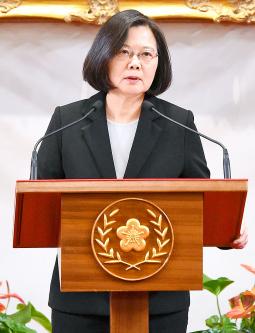President Tsai Ing-wen (蔡英文) yesterday said that Taiwan and its people would never accept a “one country, two systems” arrangement and urged China to bravely embark on the path to democracy to fully understand the minds of Taiwanese.
“Taiwan will never accept the concept of ‘one country, two systems.’ The majority of Taiwanese are staunchly opposed to the concept. That is the ‘consensus of Taiwan,’” Tsai said in response to an address earlier yesterday by Chinese President Xi Jinping (習近平) in Beijing to mark the 40th anniversary of a policy statement that paved the way for cross-strait interactions.
In an unusually harsh tone, Tsai said that the core reason her administration has never accepted the so-called “1992 consensus” is because Beijing’s definition of “consensus” translates to “one China” and “one country, two systems.”
Xi’s speech — in which he mentioned joint cross-strait efforts to push for “national unification” as part of the “1992 consensus” — confirmed her government’s doubts, she added.
The “1992 consensus” — a term former Mainland Affairs Council chairman Su Chi (蘇起) in 2006 admitted making up in 2000 — refers to a tacit understanding between the Chinese Nationalist Party (KMT) and the Chinese Communist Party that both sides acknowledge there is “one China,” with each side having its own interpretation of what “China” means.
Beijing has long made acknowledgment of the “1992 consensus” a prerequisite for cross-strait dialogue, but there have been debates on whether it provides room for both sides of the Taiwan Strait to have their own interpretations of “China.”
Xi’s definition in his speech is expected to further fuel speculation that the “consensus” means different things for the KMT and the Chinese Communist Party.
Tsai also blasted Xi for inviting political parties, groups and individuals from Taiwan to engage in talks on cross-strait political issues, saying that in a democracy, all political negotiations concerning cross-strait relations require a mandate from the people and must be subject to public scrutiny.
“In addition, it must be carried out by governments on both sides of the Strait and in a government-to-government manner,” she said. “Under the principle, no one and no group is entitled to engage in political negotiations [with China] on behalf of Taiwanese.”
She again reiterated her “four musts” proposal for cross-strait ties: China must recognize the existence of the Republic of China, respect the democracy and freedom that Taiwan’s 23 million people hold dear, resolve cross-strait differences in a peaceful and equitable manner, and engage in negotiations with the government of Taiwan or an institution with a mandate from the government.
Meanwhile, the Mainland Affairs Council in a news release rejected Xi’s proposal for “democratic and political negotiations” on the basis of the “1992 consensus” and opposition to Taiwanese independence, saying that making “one China” a prerequisite for such negotiations is a clear attempt to divide Taiwan and eliminate its sovereignty.
Given that the implementation of a “one country, two systems” model in Hong Kong has led to the deprivation of freedom, human rights and the rule of law, it is not a concept that would be accepted by Taiwanese, the council added.
The Ministry of Foreign Affairs also accused Xi of trying to force his “one China” principle and “one country, two systems” concept on Taiwanese in disregard of Taiwan’s status as a democratic nation and its people’s right to determine their own future.
“We urge the international community to continue to support Taiwan, allowing it to continue to shine as a beacon of democracy in the Asia-Pacific region,” it said.
Source: Taipei Times - 2019/01/03





















